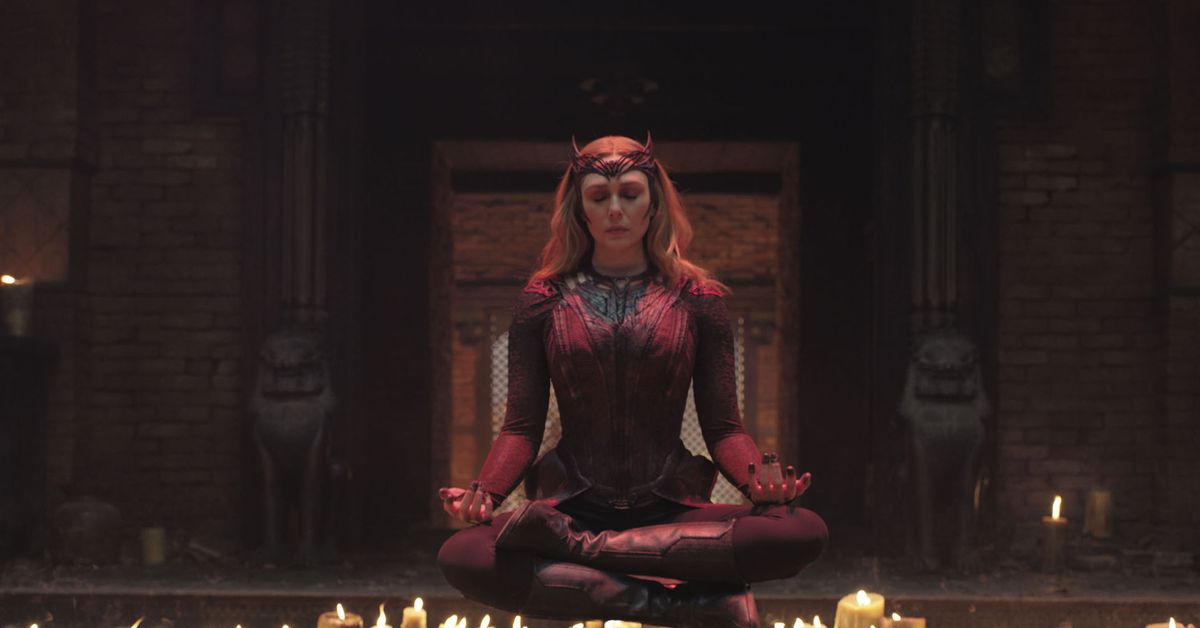Immediately after Doctor Strange in the Multiverse of Madness premiered, some fans started rebelling over some of the film’s biggest plot points, particularly the ending. Major changes to a familiar character will do that. Inevitably, theories and protests started flying, and the fate of the movie’s villain sparked immediate online arguments, hypotheses, and hopes. Polygon recently spoke with the film’s screenwriter, Michael Waldron, also a writer and producer on the Marvel Studios series Loki and on Rick and Morty. We asked him two of the questions that have come up most on the internet since the Doctor Strange sequel premiered — specifically about Wanda Maximoff, the Scarlet Witch.
[Ed. note: Major plot spoilers and ending spoilers ahead for Doctor Strange in the Multiverse of Madness.]
:no_upscale()/cdn.vox-cdn.com/uploads/chorus_asset/file/23434422/SRV_12030_R.jpg)
Photo: Jay Maidment/Marvel Studios
Some fans bridled at the reveal that happens early in the first act of Multiverse of Madness — Wanda, fresh off a new trauma and a life-changing experience with her two seemingly imaginary children in WandaVision, winds up being the film’s villain. She’s obsessed with using the potential of the multiverse to find a world where her children of her are real and alive, and she’s willing to kill anyone who gets in the way of that goal. By the end of the movie, though, she has a moment of regret and clarity, and she seems to take her own life while destroying a site that gave her immense power.
Fans don’t necessarily want to believe Wanda’s dead, though. Is she? Waldron says he really couldn’t say for sure.
“I can’t,” he tells us. “I hope she isn’t, but I have no idea. A giant mountain fell on her, but she’s pretty strong. So I guess I don’t know. Time will tell. But as a fan of Wanda and Lizzie [actor Elizabeth Olsen]I’d sure like to see her again.”
That hedging is understandable, given that even if Waldron’s script definitively said “Wanda Maximoff dies and is absolutely actually dead, forever,” superhero stories have a long-standing habit of finding ways to resurrect the dead. In this case, Wanda might be impervious enough to survive the deliberate collapse of Wundagore Mountain — particularly given her reality-altering powers, and the sheer amount of physical damage she takes and shakes off throughout the film. Or the MCU could just replace her with a different Wanda from another part of the multiverse, possibly one who didn’t experience the same traumas and would enable different kinds of stories.
Waldron says it makes sense that fans would be spinning out these kinds of theories and hopes for the future, rather than taking Wanda’s apparent on-screen death literally. “I guess it’s natural, right?” he says. “I mean, I’ve been a fan of things, and wanted things to happen differently. But that doesn’t mean I didn’t get the right ending. It ultimately just means that what I watched made me feel something strongly, which is a success in itself.”
Waldron says fan resistance to dramatic character change or death is inevitable. “When you make something for such a wide audience, the responses are going to absolutely run the gamut of thrilled to devastated with some of the choices you’ve made,” he says. “And that’s what you sign up for when you make an MCU movie. But you can’t let that scare you from making bold storytelling choices. Otherwise you won’t make anything interesting.”
He adds that none of the responses have really bothered him: “You’re glad people care.”
One of the “bold storytelling choices” he’s referencing is making Wanda into an outright mass murderer. She kills heroes without guilt or hesitation throughout the movie, and spends most of its run time trying to murder America Chavez, a teenager whose multiverse-jumping powers Wanda plans to steal for herself. Fans of the character have understandably been angry, both because she falls so uncharacteristically far into selfish, outright evil choices, and because her motivations for her — doing it all for her kids — fit into a long-time stereotype where female characters are too often focused exclusively on their children.
:no_upscale()/cdn.vox-cdn.com/uploads/chorus_asset/file/22302243/WMS1180_104_comp_v005_r709.1025.jpg)
Image: Marvel Studios
“Well, I get it. I get them being angry,” Waldron says. “It bums me out too that she does those things. As the writer, what I had to do was understand, Is this something she could do? Does it make sense for this character, and for all of us? This was a decision not made lightly, to make Wanda the antagonist of this film.”
That said, Waldron says he felt the decision was well-grounded in the story Marvel movies have been telling about Wanda for the past several years. “Given the journey she’d been on her, given the enormity of her trauma, of her grief, given the events of WandaVision, culminating with her acquiring the Darkhold and learning about her destiny as the Scarlet Witch, I think that once she opened that book, and that book started whispering to her about the truth that her kids were out there, that was enough,” he says . “That was enough to push her over to the edge.”
“And then she’s pushed even further by Strange, and by everybody else. You hear her calling out their hypocrisies of her — You do the same, you break the rules and become a hero; I do it and I’m the enemy. By the end, I felt like, Yeah, this is a justifiable decision. It’s one we collaborated on with Lizzie. And she certainly sells it, and she is such a tremendous actor that it just felt like we could do it. And I’m glad we did. It’s a lot of fun, and I think it’s a powerful step for the character.”
